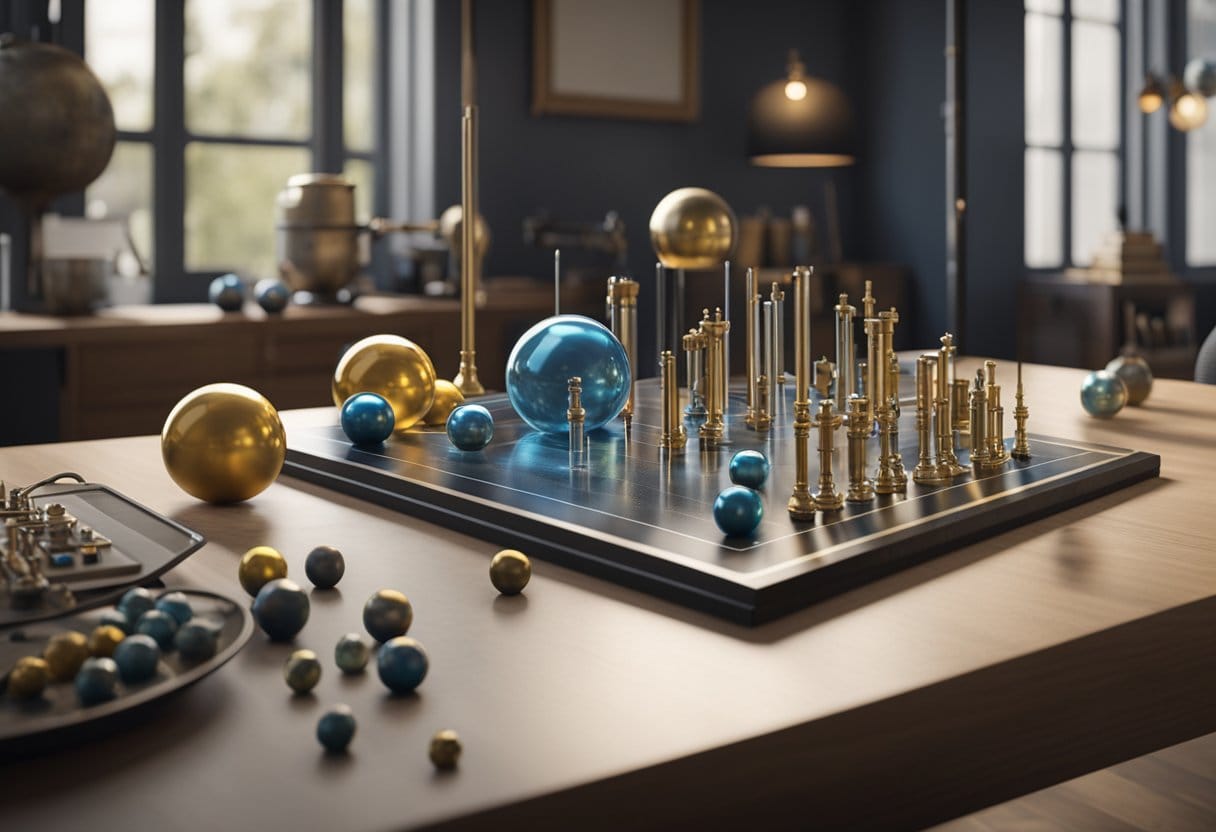Bal-Tec - Precision balls for metrology: Advancing accuracy in measurement science

Precision balls play a key role in metrology, the science of measurement. These tiny spheres help ensure accuracy in tools and machines across many industries.
Bal-tec™ makes custom balls for various metrology needs, from ball bars to probe spheres.

Bal-tec™ offers balls in many materials, sizes, and quantities to meet specific requirements. Their products include steel and stainless steel balls, as well as more unique options.
The company can create balls for CMM calibration equipment, fluid control, and other specialized uses.
With over 70 years of experience, Bal-tec™ brings deep knowledge to precision ball manufacturing. Their expertise covers areas like ball sizing, valve technology, and dimensional metrology.
This know-how allows them to produce high-quality balls that meet strict industry standards.
Overview of Bal-Tec Products

Bal-Tec offers a wide range of precision balls and related products for metrology applications. Their lineup includes custom-made balls in various materials and sizes, as well as calibration equipment for coordinate measuring machines (CMMs).
Precision Ball Manufacturing
Bal-Tec manufactures custom-made balls of any material, size, quality, and quantity. They produce steel and stainless steel balls, as well as balls made from more exotic materials.
Their manufacturing capabilities are extensive. Bal-Tec operates out of a 50,000 square-foot facility with state-of-the-art equipment.
The company can create balls to meet specific customer requirements. This includes:
- Balls of any size
- Various material options
- Different quality grades
- Custom quantities
Bal-Tec also offers plastic balls with precise specifications. Grade 3 plastic balls, for example, are spherical within 0.003 inches and match the specified diameter within ±0.003 inches.
Applications in Metrology
Bal-Tec's products find extensive use in metrology and measurement applications. They produce a range of CMM calibration equipment suitable for machines of all sizes.
Key metrology products include:
- Ball bars
- Probe characterization spheres
- CMM pallet systems
These tools help ensure the accuracy of coordinate measuring machines. Bal-Tec's precision balls are crucial for calibrating and verifying the performance of CMMs.
The company also manufactures ball seats for controlling fluid or gas flow. This showcases the versatility of their precision ball products beyond just measurement applications.
Material Selection for Precision Balls

Choosing the right material for precision balls is crucial for metrology applications. Different materials offer unique properties that affect accuracy, durability, and performance in various environments.
Stainless Steel Balls
Stainless steel is a popular choice for precision balls due to its strength and corrosion resistance. Chrome alloy steel balls make up about 90% of all balls manufactured. They have a hardness range of 60-65 HRC when properly heat-treated.
Stainless steel balls are magnetic and can withstand high temperatures. They're ideal for applications requiring durability and dimensional stability. These balls resist wear and maintain their shape under pressure.
Common grades include 440C and 316 stainless steel. 440C offers excellent hardness, while 316 provides superior corrosion resistance. The choice depends on the specific requirements of the metrology application.
Ceramic Balls
Ceramic balls offer unique benefits for precision measurements. They're lightweight, non-magnetic, and highly resistant to wear and corrosion.
Common ceramic materials include silicon nitride and zirconia.
Silicon nitride balls have low density and high hardness. They perform well in high-speed and high-temperature environments. Zirconia balls offer excellent dimensional stability and chemical resistance.
Ceramic balls maintain their roundness over time better than metal balls. This makes them ideal for long-term precision applications. They're often used in aerospace, medical devices, and high-performance bearings.
Plastic and Glass Balls
Plastic and glass balls serve specific roles in metrology. Plastic balls are lightweight and cost-effective. They're suitable for low-load applications and environments where metal balls might cause damage.
Common plastic materials include nylon, acetal, and PTFE. Each offers different properties like chemical resistance or low friction. Plastic balls work well in food processing and pharmaceutical equipment.
Glass balls provide excellent roundness and smooth surfaces. They're non-magnetic and resist corrosion.
Glass balls are often used in precision valves, pumps, and spray applications. They offer good visibility, making them useful for flow visualization studies.
Manufacturing Process

Precision balls go through several key steps to meet strict metrology standards. The process involves careful shaping, heat treatment, and finishing to achieve the required accuracy and surface quality.
Heading and Flashing
The first stage in making precision balls is heading and flashing. A machine cuts metal wire into small pieces and presses them between two hemispherical dies. This forms rough ball shapes with a thin ring of excess metal around the middle.
The flash ring is then removed through a trimming process. Special grinding wheels smooth out the area where the ring was attached. At this point, the balls are not yet perfectly round or sized.
Heat Treatment
Heat treatment is crucial for hardening the balls and improving their wear resistance. The balls are heated to high temperatures in a furnace, then quickly cooled.
Hardened balls are checked for proper hardness using specialized testing equipment. Some manufacturers use a chemical etching process to look for defects that may have occurred during heat treatment.
This step gives the balls their final hardness and helps ensure consistent properties throughout the material.
Grinding and Lapping
The final shaping happens through precise grinding and lapping. Grinding removes material to get close to the final size and shape.
Balls are rolled between a fixed plate and a grinding wheel to achieve roundness.
Lapping is the last step. It uses a fine abrasive to polish the balls to their final size and surface finish. Balls are rolled between two cast iron plates with a lapping compound.
This process can achieve extremely tight tolerances. High-end metrology balls may be accurate to within millionths of an inch in both size and roundness.
Bal-Tec's Quality Assurance

Bal-Tec maintains strict quality control measures to ensure their precision balls meet the highest standards. They use advanced testing equipment and follow rigorous industry certifications.
Inspection and Testing
Bal-Tec uses state-of-the-art inspection tools to check every ball. They measure size, roundness, and surface finish with extreme accuracy.
Optical calibration balls are used to verify measurement equipment. This ensures consistent quality across all products.
Bal-Tec tests balls for:
- Diameter
- Sphericity
- Surface roughness
- Material composition
They use precision gauges accurate to millionths of an inch. Computer imaging systems scan for tiny flaws invisible to the human eye.
Certifications and Standards
Bal-Tec follows strict industry standards for ball quality. They use the AFBMA grading system to classify balls by precision level.
Their quality ratings include:
- Grade 3: ±0.003" diameter tolerance
- Grade 5: ±0.000125" diameter tolerance
- Grade 10: ±0.000025" diameter tolerance
Bal-Tec provides certificates of conformance with each order. These verify the balls meet or exceed customer specifications.
They maintain ISO 9001 certification for their quality management system. This ensures consistent manufacturing processes and continuous improvement.
Custom Precision Ball Capabilities

Bal-Tec offers a wide range of custom precision ball options. They can produce balls in various sizes, materials, and precision grades to meet specific needs.
Size Customization
Bal-Tec manufactures precision balls in sizes ranging from 0.005 inches (0.13 mm) to over 17 inches (400 mm). This broad size range allows for flexibility in different applications.
Customers can request balls in any size within this range. Bal-Tec's advanced manufacturing processes ensure accuracy even for unusual or non-standard sizes.
For metrology applications, size consistency is crucial. Bal-Tec maintains tight tolerances across batches of custom-sized balls.
Special Material Requirements
Bal-Tec produces balls from a variety of materials. These include metals like steel and stainless steel, as well as more exotic options.
Plastic balls are available for applications requiring lightweight or non-conductive materials. Grade 3 plastic balls have a sphericity within 0.003 inches (0.0762 mm).
For high-wear applications, Bal-Tec offers balls made from durable materials like tungsten carbide. Special coatings can be applied to enhance specific properties.
Customers can work with Bal-Tec to select the best material for their unique requirements. This might involve considerations of hardness, corrosion resistance, or thermal properties.
Precision Grades
Bal-Tec produces balls in various precision grades to suit different applications. Higher grades offer tighter tolerances on size and sphericity.
For the most demanding metrology applications, ultra-precision balls are available. These balls have extremely tight tolerances for size, roundness, and surface finish.
Measuring precision balls presents unique challenges. Bal-Tec works with customers to ensure compatibility between their manufacturing and the customer's measurement capabilities.
Precision grades are specified based on industry standards. Bal-Tec can provide documentation and certifications for the precision grade of custom balls.
Packaging and Distribution

Bal-Tec takes great care in packaging and distributing its precision balls. The company uses specialized containers to protect the balls during shipping.
Each order is carefully packaged to prevent damage. Balls are often wrapped in protective materials like foam or bubble wrap. They are then placed in sturdy boxes or cases.
For smaller orders, Bal-Tec may use padded envelopes. Larger orders might be shipped in crates or on pallets. The packaging method depends on the size, quantity, and material of the balls.
Custom-made balls of any size or material can be packaged to meet specific customer needs. Bal-Tec works with clients to ensure proper packaging for their unique requirements.
The company ships precision balls worldwide. They use reliable carriers to ensure safe and timely delivery. Tracking information is provided for most shipments.
Bal-Tec's distribution network allows for quick delivery to many locations. They can handle both small and large orders efficiently.
For sensitive or high-value shipments, extra precautions may be taken. This could include additional padding or special handling instructions.
Customers can often choose their preferred shipping method. Options may include standard ground, express, or air freight for international orders.
Support and Technical Assistance

Bal-Tec offers comprehensive support for customers using their precision balls and related products.
They provide engineering assistance based on over 60 years of experience in precision manufacturing and metrology.
Customers can access the Support Center to submit inquiries.
Each support request gets a unique ticket number for easy tracking.
The company maintains an archive of all support requests. This allows customers to review their past interactions and solutions.
For immediate assistance, customers can call 800-322-5832.
This direct line connects them to knowledgeable staff who can address urgent questions or concerns.
Bal-Tec also offers technical papers and special reports on various topics related to precision balls.
These resources cover:
- Ball diameter calibration
- Ball grade standards
- Material selection
- Kinematic clamping
These documents help customers better understand the technical aspects of precision balls and their applications in metrology.

